Orlando, I've Never Loved You
How to build the perfect city
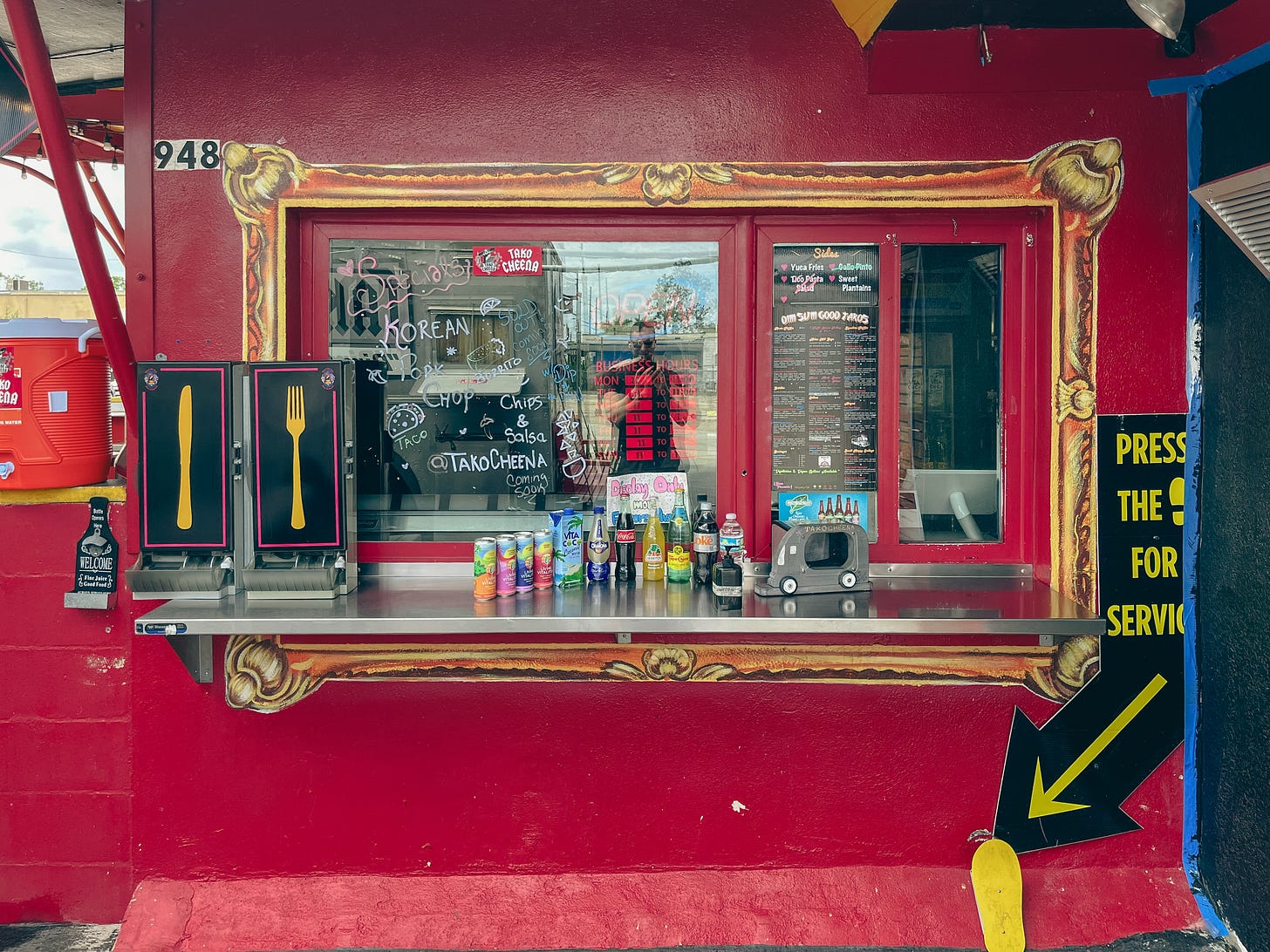
Last time I pointed out the rather alarming juxtaposition between the streets and the screens. That the streets are fairly pleasant, social, and functional (although the slope of the curve is not good). And that the screens have become some kind of blue-light nightmare unless used with extreme discipline. I think it’s worth noting that that’s an underrated point. That the default has become a dopamine spiral we just can’t get a grip on, and it’s only those with extreme discipline, or those who avoid it completely that have a good relationship with the devices.
The streets have much to teach us - and Chris Arnade helped me put words to what I had been feeling since I first left home for Greece and Turkey at 18 - not pulled by any sense of wonder or adventure, but by the ignorant bliss of youthful love. At the time, I couldn’t have cared less where or why or when I was going - as long as I was going - because she was going.
If you forced me to choose a runner-up-emotion at the time, second to being sick with something serious, it would be a feeling of freedom and independence that was essentially the cultural cornerstone of North America in the 90s (minus Mexico). That the true goal of all the frantic doing and making and buying was to be free of anything and anyone - including schedules, demands on time, or even things like a monthly rent payment. The perverse sense of emancipation and ‘freedom’ that, as Chris Arnade points out, essentially became ‘…the American argument for America.’
“A person independent of all community seems to be one of the end goals of modern liberalism (in the philosophical sense), but that is a contradiction of human nature.” - Chris Arnade
This is a young man’s game, and one that starts to feel awfully hollow. I devoured Oliver Burkeman’s Four Thousand Weeks, largely because of how well he crystallized this feeling of emptiness in modern freedom - what he called the myth of the digital nomad.
“But ‘Digital Nomad’ is a misnomer - and an instructive one. Traditional nomads aren’t solitary wanderers who just happen to lack laptops; they’re intensely group focused people who, if anything, have less personal freedom than members of settled tribes, since their survival depends on their working together successfully.” - Oliver Burkeman
For those that aspire to write non-fiction, that chapter is on the pantheon - one that starts to border on the alchemical. Or what Steve Rinella calls ‘…black magic shit.’
Chris was recently asked to be the keynote speaker at the Strong Towns 2025 conference in Providence, Rhode Island. His approach was to try and crystallize what he’s learned from a life in high finance, and then walking cities. To create a ‘…grand unified theory,’ of what might make the perfect city, and how to build that city.
Like Burkeman, and Rinella before him, How to Build the Perfect City helped me put into words what I had long been feeling, but couldn’t quite articulate.
In the next few essays, I’ll try to use my own words and experiences to add to what Chris has already written. That, as far as I can tell, is the true promise of Substack. That each essay is an infinite rabbit-hole of sorts. One great essay - this essay - has embedded links, connections, and throughways to a seemingly infinite amount of other useful human ideas. Please weave your way through as if it’s a magical adventure (because it is).
Like his beloved 10-mile river walk in Seoul, one great Substack essay is the gift that keeps on giving.
Please enjoy!
“Most impressive though is how the people use the space. At almost all times it is busy with mothers walking kids, groups of older women kitted in walking outfits, including absurdly long visors, power walking its length, men, dressed like they are in a 50s gangster movie walking tiny dogs. Or biking with small dogs in baskets.” - Chris Arnade
What is a Strong Town?
I’ve said on this newsletter before that I have a raging anxiety about somehow ending up as a lonely pontificator. Someone who only has opinions but doesn’t actually do anything. What I see as the only logical conclusion for the segment of the economy called ‘Management Consultants.’ I’m sorry, but it’s how I feel.
As Jobs points out, to make recommendations - to act! - and to own the results of those actions over a long period of time is where mastery is to be found. The Humble Stumble is often punctuated with failure, and set back, and hardship, and heart break - and that is perfectly normal, and quite alright, actually. That’s the deal of being a human on earth, and there is no escaping it.
“The first step is to realize that life is a process.” - Stutz
What I really want is to be an actor in the great drama (so far so good), and spend the marginal time writing this newsletter and making conversations with people who are featured on it.
I’ve never stated this explicitly, but I would like to grow this Substack community to 1,000 interesting people, who want to help build a people and place that we can all be proud of - economic development and community building as a process by which we work to achieve our full potential.
That, as far as I can tell, is a shared emotion between Chris and I, and part of the reason he was excited (albeit nervous) to give the Strong Towns keynote.
“I’ve been an admirer of their vision, which is to make our cities more livable, and who they are, which is a mix of academics, engineers, city management professionals, and then most importantly, engaged ‘normies’ who take seriously the last part of the “Think globally, act locally” bumper sticker.”
In essence - how we live, and what makes a great place to live. In the era of extreme mobility and globalization, this is perhaps the question.
“…because while urban planning can sound pedantic, trivial, and boring, how we choose to live is as fundamental a question as exists.” - Chris Arnade
It was the question - without me knowing it - that led to my career after a University degree of ‘I have no idea what I’m doing here but I know what I’m interested in is how the world actually works and I have to discover that somehow and eventually draw an income.’
After graduation, I joined a team at my local (now regional) YMCA, who had won federal contracts to support and deliver on what was, at the time, the largest immigration effort the country had seen in decades. Economic opportunity was the 1A and 1B goals of those we settled (long-term), and that led me to the creation and delivery of an entrepreneurship support program for immigrant entrepreneurs. That, in turn, led to the creation of an outfit like that, but with more reach, and pursuing the national EDAC designation.
The thread for me is crystal clear - all I’ve ever worked on is how the world works - helping people navigate the system they’re in, with the express goal of getting what they want - from building companies, to getting meaningful work, to settling a family.
I don’t want to leave the frontlines and be a full-time observer - as much as I love to write - because how the world works could easily be edited to read ‘how the system works.’ Navigating the system as best one can is the fundamental human condition and we need key things on the road toward that worthwhile pursuit.
“It’s easy to do what I do, which is walk around the world and make observations about how it should be, before moving on to the next place. It’s much harder, and more admirable, to do what the Strong Towns members do, which is dig in their heels and try to change things to make their neighborhoods better, one speed bump, one bike path, and countless city zoning/planning sessions at a time.” - Chris Arnade
We’ll deal with economic opportunity in the next few essays - but I can think of no better place to start, than with the need for community.
“The famous quote, "No man is an island entire of itself; every man is a piece of the continent, a part of the main..." could be rewritten far less poetically as "Everybody lives in a city, with a zoning policy, tax commission, and an unwritten social contract." - Chris Arnade
The Desire (the need!) for Community
Relationship is, at it’s most basic, the community we live in. We carry evolutionary baggage that makes it very hard to understand anything other than our most local context, which also happens to be why - think global, act local - is actually quite good advice.
The Ancients knew this, even if we’ve forgotten it. Aristotle said that… “Anyone who cannot form a community with others, or who does not need to because he is self-sufficient, is no part of a city-state; he is either a beast or a god.”
As compared to our ancient past and the long history, the world globalized, urbanized, and shrunk mere moments ago. Maybe even faster than we ourselves could get a grip on. Perhaps to our dismay, we need patience and empathy for those who aren’t adjusting as well as others. Young millennials (and certainly Gen Z) are naturally cosmopolitan and find urban, diverse places exciting and dynamic. The older generation of deep social ties and family connections is finding it harder, in general, and we need to support everyone on this path, and through this process.
Some people and places seem to be doing a better job than others of maintaining and building a culture around this new world order, that works.
There are two key points here.
The first is that to build a culture, we need social agreements that go beyond the law. If all we have to agree on is what could get you in trouble with the authorities, we’re already in deep trouble as a community.
The second is the idea of trust. In the four possible combinatory quadrants of Trust vs. Regulation (high or low), the worst of all worlds is High Regulation x Low Trust, for the exact reason of Point #1. My intuitive fear right now that our current state of affairs is less a policy problem, and more an us problem.
We did a lot of good work in the years after 2016 - a lot of good work - but one mistake we likely made was pretending (and communicating) that it was all going to be perfectly easy. We didn’t acknowledge that the community was changing rapidly and that it would change permanently, through this process. That would, naturally, come with growing pains that we brushed off, and we shouldn’t have done that.
Chris’s first major point on How to Build the Perfect City is that everyone, everywhere, needs community - and we will go to great lengths to get it. After writing for many years on how McDonald’s has largely filled this community-shaped hole in certain demographics in America, he realized that regardless of what form it takes, humans will form communities because our connection to each other is what defines a good life. We can’t not do it. We’re pack animals and we are damaged in ways even unknown to ourselves when we find ourselves without it.
It’s our blessing and our curse - if the structure of the community and culture makes it easy, and functional to gather, people will gather. If the only place they can do that in any safe, functional, meaningful way is McDonald’s then so be it, they’ll do that too.
“That people would intentionally linger in a business designed for quick turnover showed how deep that need is, because that’s the natural state of mankind.” - Chris Arnade
In my Canadian context, it’s akin to the morning meetups in Tim Hortons - largely older folks (almost always older folks) waking up early and meeting to gab about the news of the day, or nothing much at all, other than an excuse to be around other people. It’s not more complicated than it’s an easy local. It’s nearly always open, it’s cheap, and loitering isn’t frowned upon at all.
Although the young, liberal, and ‘free’, in my cultural context don’t seem to think they need these cultural ties in the same way - the whole argument that I’m making here is that they do, and if it isn’t going to be church or local volunteering, we have to find a way to make it happen, and it can’t only be the pub. That might be pretentious and painting too much with my own brush, but that’s my intuition.
This is as important to modern economic development as anything is. If Larry Smith is right, and economic development really is… ‘a process by which a community works to achieve it’s full potential,’ then our potential can only be expressed as a sum of the whole - by us. And in modern times - with how unbelievably fast most of the world has solved for Maslow’s Hierarchy of Needs ‘…human despair is no longer primarily a result of economic destitution; rather it is due to a lack of functional and healthy communities.’
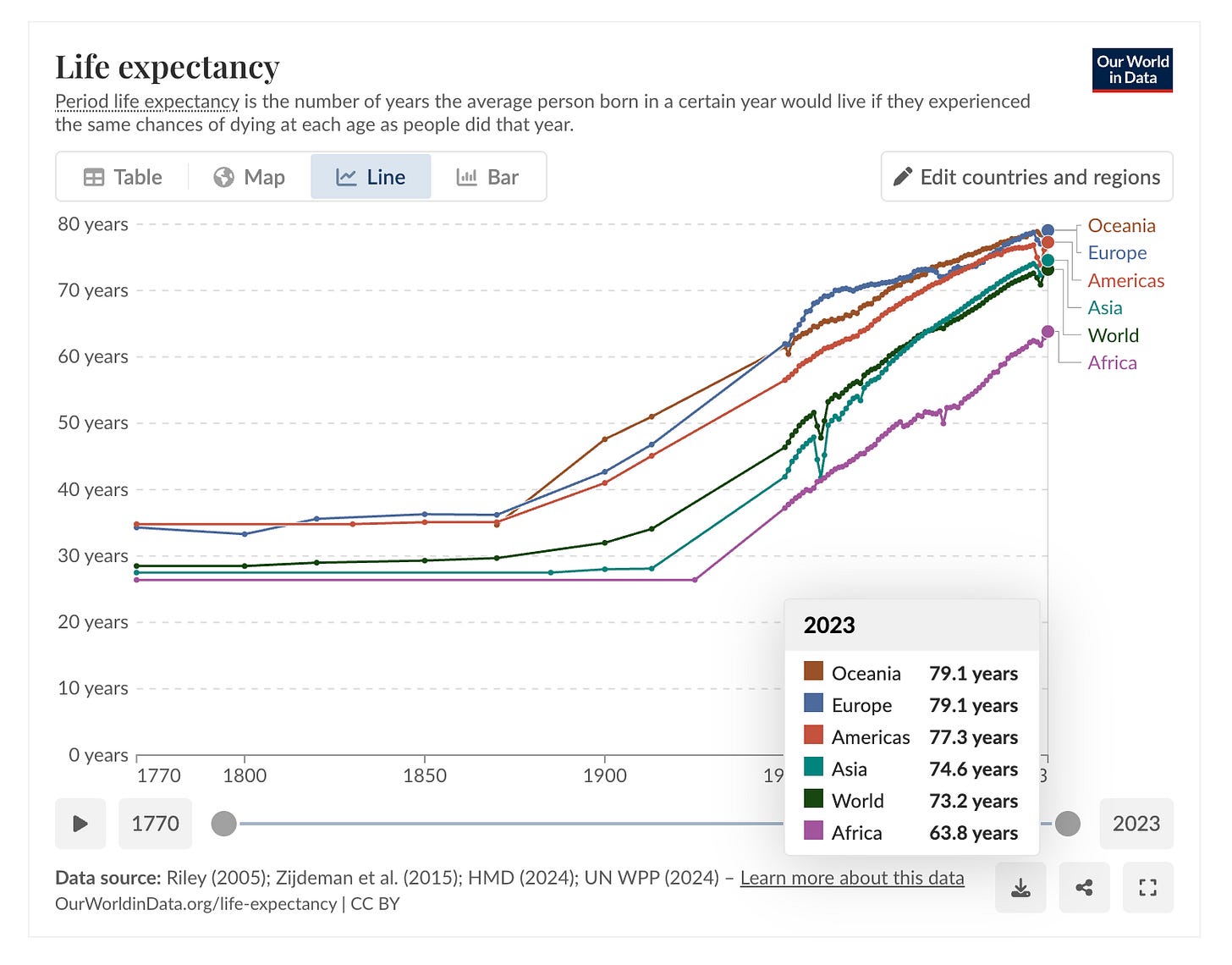
“A corollary of this is that happiness, fulfillment, and human flourishing are inseparable from the social, and the current challenge for most of the world’s political class is understanding that.” - Chris Arnade
At the margin, housing and health are critical, and are, of course, barriers to achieving one’s full potential - but much of the world has advanced so rapidly that most of us don’t suffer because we don’t have the latest iPhone, we suffer because we’re suddenly disconnected from each other, in a way that we can’t quite put our finger on but is deeply disturbing to us on an emotional and spiritual level.
As far as I can tell, if the only spaces we have are home and work, we’re completely screwed as a culture. I’m not saying that’s where we are - but we are experiencing a warning shot across the bow.
The Europeans seem to understand this much more than we do in North America (again, minus Mexico). Something to the effect of, as Chris pointed out on a podcast, that the Americans built a system that prioritized cheaper iPhones, not one where you could walk to work or your church.
One is meant to foster communal experience, and well-being. The other is meant to produce ever cheaper stuff and grow GDP.
“A crude accounting of cost and calories doesn’t show much difference between these two meals, but that’s why such simple measures are so flawed. My meal in Italy was uplifting, the one in Atlanta depressing, and while the aesthetics of a breakfast might seem trivial, it isn’t, because it’s indicative of deeper, more profound differences.” - Chris Arnade
Orlando is perhaps the best example of the worst kind of place. I loathe Orlando. I could feel my cortisol increasing as we approached that miserable, commercial swamp, from the quite lovely outer, coastal bounds of Tampa Bay.
One of my favourite stories in business lore is how the primary developer of Florida’s 30A (the highest county above sea level, on average) turned down one ‘Walt Disney’ when he came knocking about development opportunities in the area. He was denied, the St. Joe company became a behemoth, and he packed his mouse-eared bags and headed for the hell-scape of Orlando.
It’s cartoonish (both intentionally and unintentionally). I consistently feel bad about just how much I hate it, and so I felt like I needed to see it properly - on foot and by scooter (I would have biked but I didn’t have a bike).
I did manage to find a rather sweet, but small, patch of Orlando - with it’s man made lake, and a lovely walking path around this lake that allowed my cortisol to come back to baseline. I found a Saturday morning farmer’s market, had a rather nice margarita flight in an old stone, whitewash building that repelled the southern sun, if only for a few moments. But I could still feel the angry hordes of park-lovers around me - not but a few miles from where I happily sat.
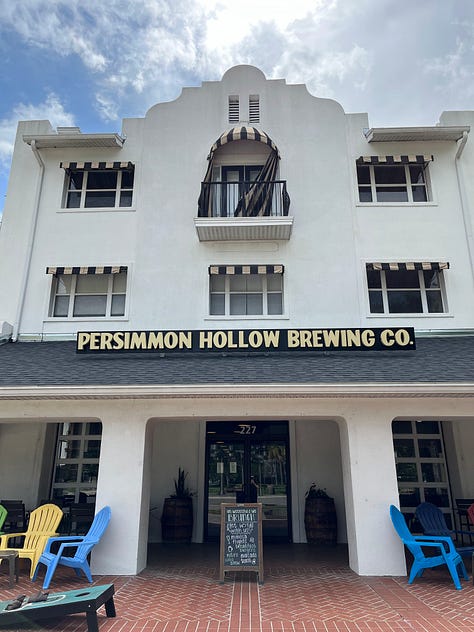
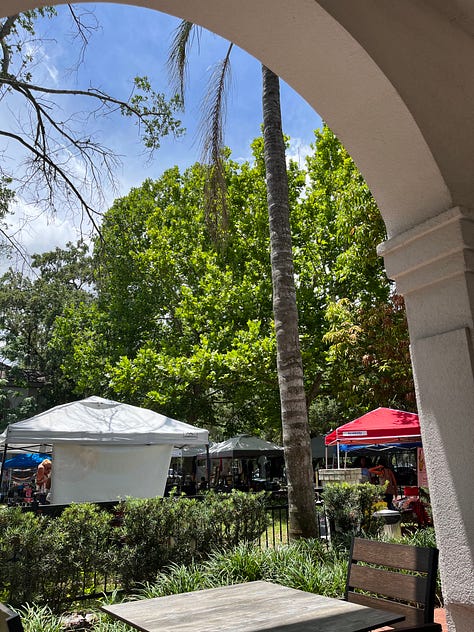
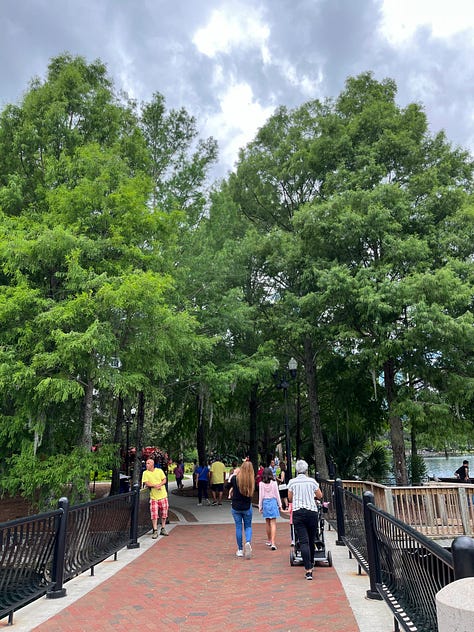
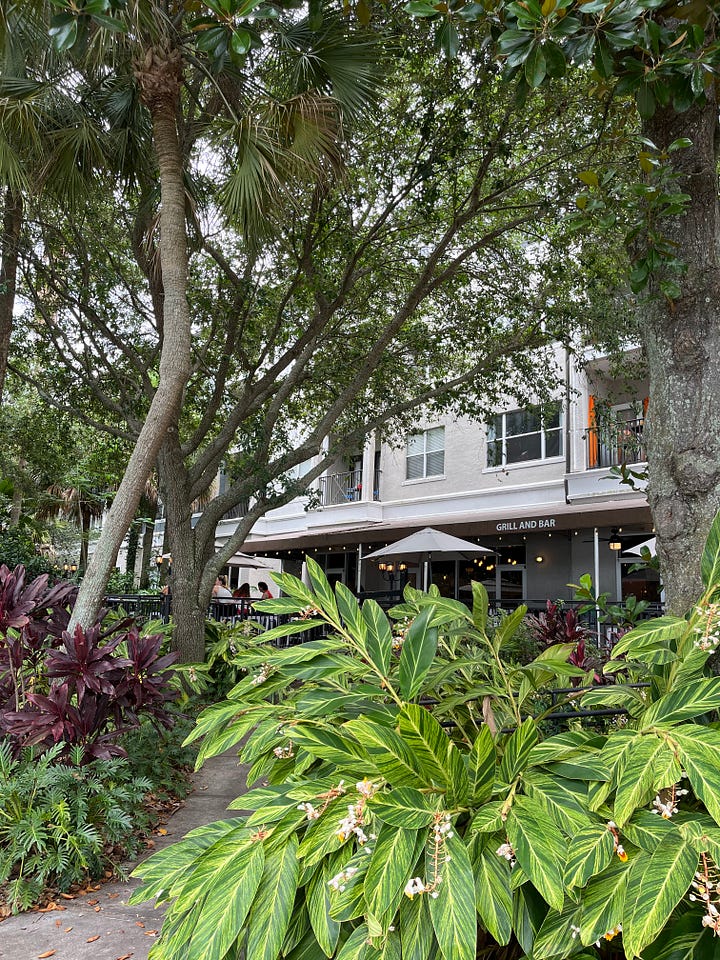
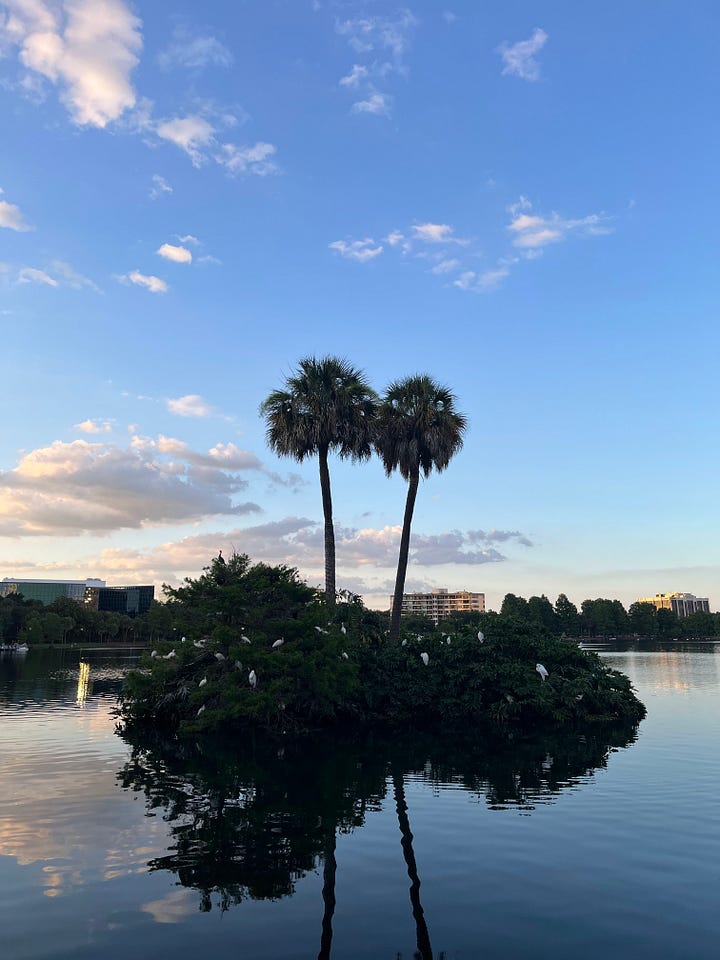
After feeling like this was all a bit too contained (I can never stay in the nicest part of town too long) I walked a long stretch North, toward the strip malls of tax accountants, jiujitsu schools, farmers markets, and money lenders. You know exactly what I’m talking about. I found a rather good coffee truck, and walked until I hit the only taco place I could find that had good reviews. It was good (quite good), and the hispanic ladies working it were delightful.

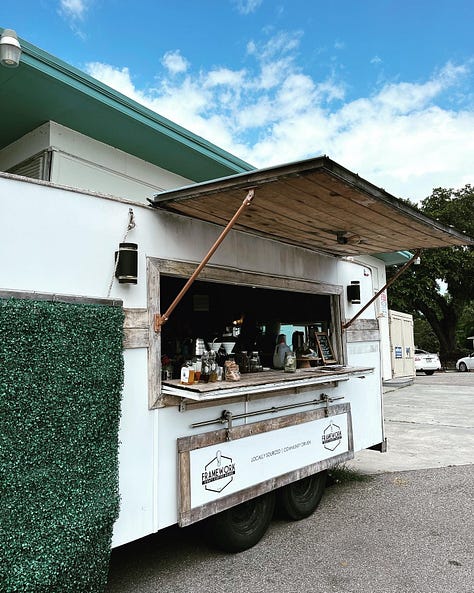
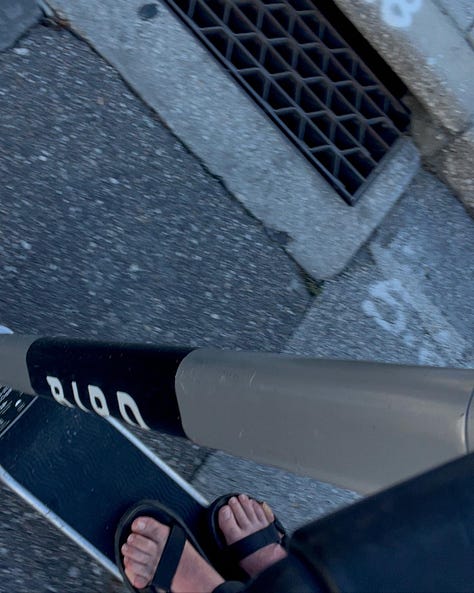
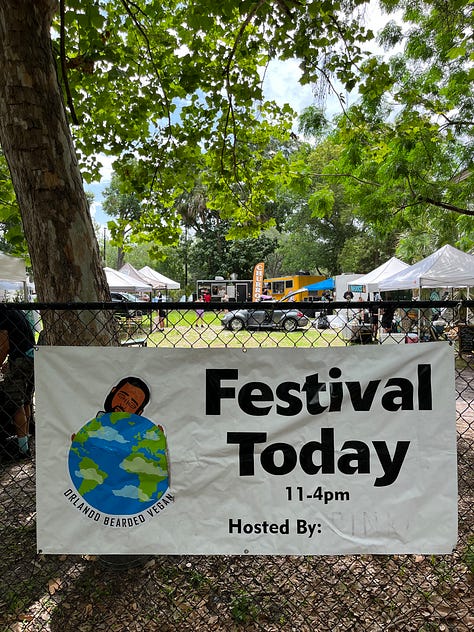
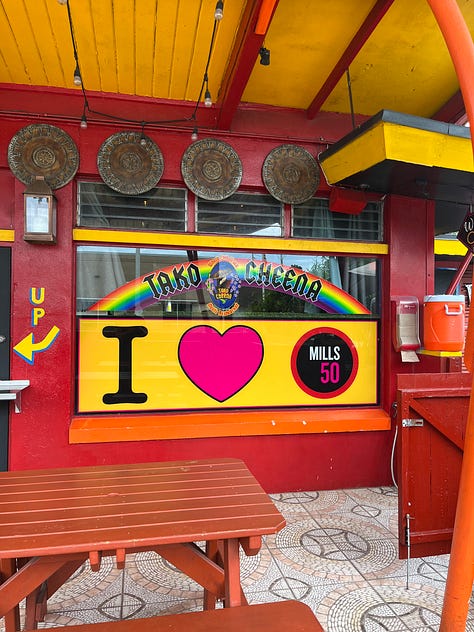
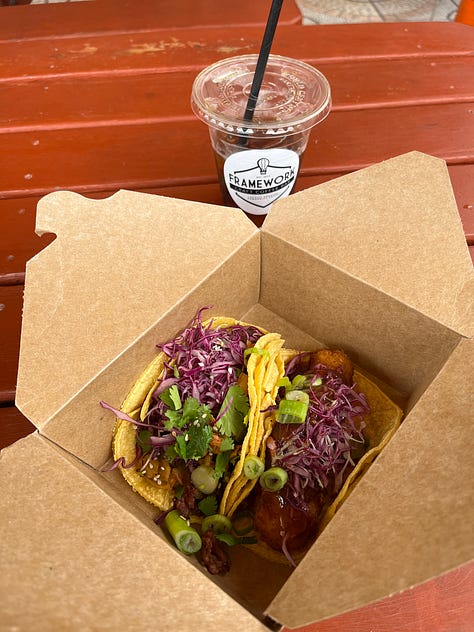
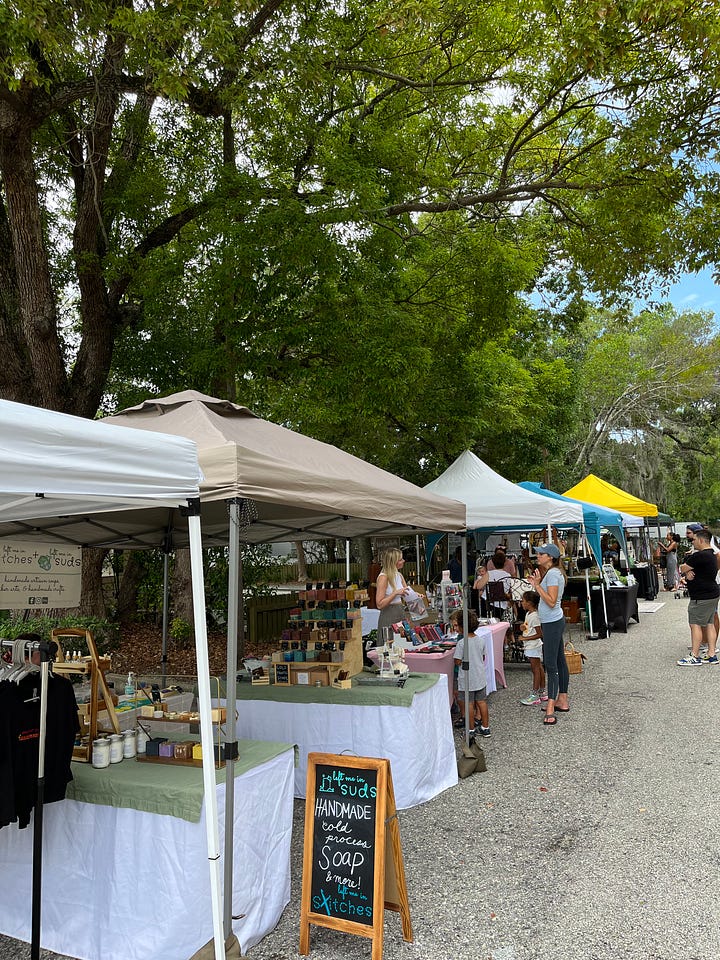
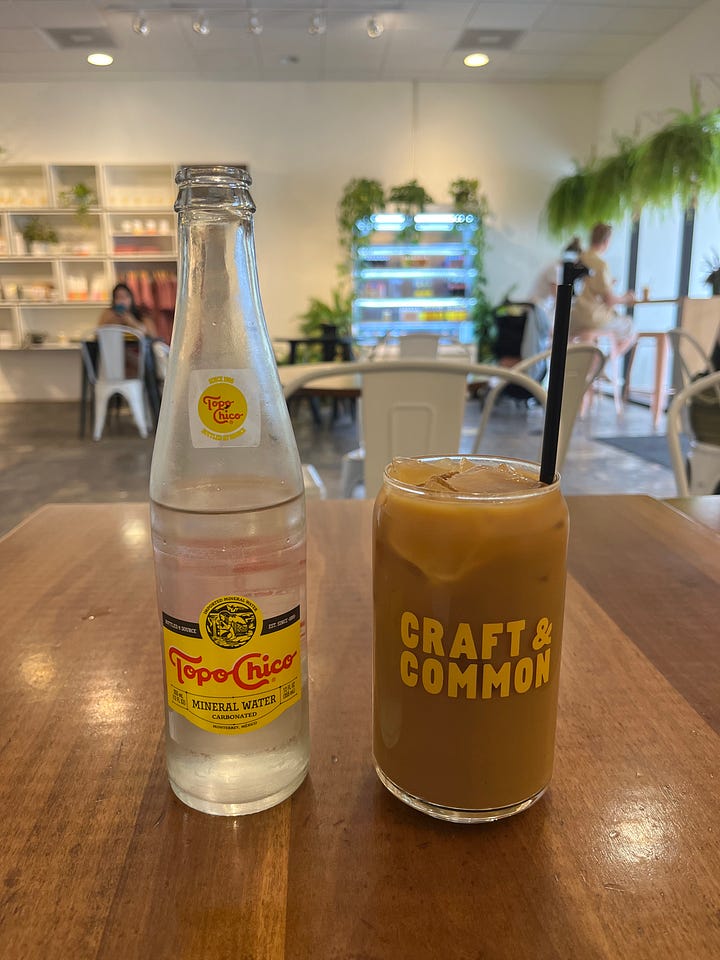
This - I’m sorry - is not the rule in Orlando. The lovely ladies I encountered are the Orlando exception. The rule is something out of the late-stage capitalism handbook, and if I was honest about what I experienced there I don’t think I could do it politely, and so I won’t. All this to say - Orlando, I’ve always hated you and my feelings have not improved.
Orlando though, as is true of all places and all people, is an education and I ought to be grateful for that. When I started my economic development training with the good folks at the University of Waterloo, I did not have ec dev as a community health function, but I’m now certain that it is.
“…building healthy cities is currently more important than building a stronger economy, and so getting our urban planning right is now more than ever a societal health issue.” - Chris Arnade
Unfortunately, the slope of the curve in my local community is not positive. But there is a resurgence on the horizon! A renaissance of sorts (I hope). There are good people working on this stuff every day, and as I sit here writing this essay, I’m surrounded by my friends and community members at my local - a delightful coffee house, with excellent, young, vibrant baristas who care about making this space - and this coffee - something to gather around. It’s become both a place of social life and business (key point!) - the former Mayor stopped by for a quick handshake and a hello before his meeting. It’s that kind of place, and at it’s best, it’s that kind of community.
We need it now more than ever. Or, more simply, we need it now as much as we always have.
—
All we need is a point of view, a set of tools, and a lot of time.
See you on the road.
“The English working class has a place. It’s not necessarily the best place. But it’s a place, and they make the best of what they have.” - Chris Arnade



